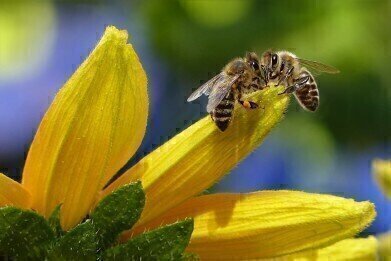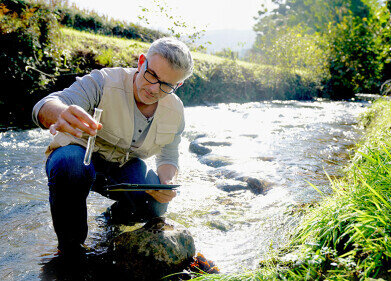Environmental Laboratory
Can Bees Become Addicted to Nicotine?
Apr 25 2015
The bee population in the UK has been falling dramatically over the last decades for several different reasons. Some of these, such as climate change, disease and alien species, are harder to avoid than others… but some are entirely manmade; namely, pesticides.
For many years, the Soil Assocation, Greenpeace and other bee-friendly groups have been campaigning for an outright ban on pesticides. Back in 2009, the Soil Association condemned the decision of government official Hilary Benn not to follow the lead of other European countries, such as France and Germany, in banning one substance in particular: neonicotinoids. Though studies have not been entirely conclusive, there is a growing body of evidence which places the blame for the drastic demise of half of the UK’s native bee species at the feet of neonicotinoids. Now, there may be even more cause for concern.
Addictive and Deadly
As well as being detrimental to the health of bees, the first studies have emerged which suggest neonicotinoids may have a similar effect on bees as nicotine does on humans. Scientists from the University of Newcastle recently uncovered findings that bees showed a preference for a sugar solution that contained imidacloprid and thiamethoxam. The study, which was published in the academic journal, Nature, suggests a link between addiction and neonicotinoids.
Furthermore, a study by Maj Rundlöf and her team of scientists at Lund University in Sweden has offered the most conclusive proof to date that the substance is harmful to bees. The study, which is being hailed as the first "real world" experiment, concluded that the bee population halved around fields which contained the harmful chemicals.
Predictably, those involved in the neonicotinoid industry have hit back at the claims. Chief executive of the Crop Protection Association (CPA) Nick von Westenholz spoke out in defence of the pesticide companies. “The latest studies in Nature must be seen in the context of an ongoing campaign to discredit neonicotinoid pesticides, regardless of what the real evidence shows,” he said. His argument was that Rundlöf’s study involved amounts of neonicotinoids greater than those which are used commercially.
A Slow Process
Clearly, convincing private businesses to do away with their use of pesticides is a work in progress. Unfortunately, it’s also difficult to convince the government to take action as well. The Department for Environment, Food and Rural Affairs (DEFRA) and its executive branch, the Food and Environment Research Agency (FERA) are those in charge of making such decisions. However, over the years, they have been notoriously difficult to convince that neonicotinoids are harmful enough to warrant an outright ban.
Hopefully, studies such as those conducted in Sweden and Newcastle will go even further to discredit these chemicals and lead to a more environmentally-conscious form of farming. For even more evidence of the dangers of neonicotinoids, see the article Final Nail in the Coffin for Insecticides: Toxic to Bees?
Digital Edition
IET 34.2 March 2024
April 2024
Gas Detection - Biogas batch fermentation system for laboratory use with automatic gas analysis in real time Water/Wastewater - Upcycling sensors for sustainable nature management - Prist...
View all digital editions
Events
Apr 24 2024 Jakarta, Indonesia
Apr 24 2024 Sao Paulo, Brasil
Apr 30 2024 Melbourne, Australia
Apr 30 2024 Birmingham, UK
May 03 2024 Seoul, South Korea


















